Launch of an unfinished documentary chronology and memoirs of Saeed Abutaleb
The private sector brings into the field of oral history
Sara Reshadizadeh
Translated by Ruhollah Golmoradi
2016-8-8
Ali Darabi, deputy director of provincial affairs of IRIB, in the book lunch of Saeed Abutaleb memoirs titled "Hey You", Saeed "We're still in its infancy, which is why I suggest the private sector to enter in oral history field and continue recording it in a new form quite seriously."
According to oral history website of Iran, July 25, 2016, book launch of Saeed Abutaleb's autograph of memories titled "Hey You: an unfinished documentary chronology and memoirs of Saeed Abutaleb of the US prison in Iraq'' was held in Surah hall of Art.
In the launch, Hojatoleslam va al-moslimin Seyyed Mehdi Khamushi, head of the Islamic Propagation Organization, Ali Darabi, deputy director of provincial affairs of IRIB, Seyyed Reza Mir Karimi, the film director, Elham Aminzadeh, Special Assistant to the President for Legal Affairs, Morteza Sarhangi, director of the Office of Resistance Literature and Art, and Saeed Abutaleb, author of the book, were present and made speeches.
The US narration of Cultural companions of the Islamic Revolution
Hojatoleslam va al-moslimin Khamushi, the head of the Islamic Propagation Organization, as the first speaker pointed out its 25-year acquaintance with Saeed Abutaleb and Said: "What has prompted me to attend the event, was one discussion of Mr. Abutaleb and his memoir book and the other discussion of the Islamic Revolution and the giant idolatrous in the name of America. In a time, in Iran we were fighting with an idolatrous called the shah and Said the government is not legitimate rule because a legitimate rule must follow the divine way, and this was the way that the martyrs believed it. Islamic Revolution took place, but from the first day to the present world arrogant powers are opposed with the thought of Islamic Iran and the idea of Velayat-e Fagih (Governance of the Jurist). We must understand that we are on the right track and given that decades have passed from the Islamic Revolution of Iran, we see the fruits of it around the world. Now, the dispute is in fact for our freedom and release which opposes apparatus of hegemony and arrogance under the flag of religion."
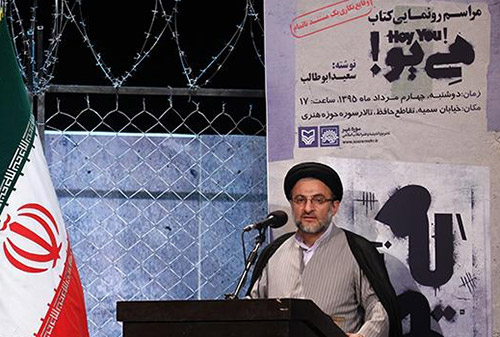
Head of Islamic Propagation Organization Said in his speech by reciting verses from the Holy Quran: "many people have martyred since the beginning of America attack to Iraq in this country, in this situation we have to think why with the myth and the slogan of freedom, these people were martyred And interestingly today in the Parliament of UK it was expressed that the invasion to Iraq had licensed with illusory and false claims of its prime minister and they are looking his response."
He also pointed out ISIS war in the region and Said: "Educating mercenary in the world is one operation of the hegemonic system and what was happening today in the region represents the nature of making mercenary of the system of domination. They have done such a definition from the world, unaware of the fact that God ultimately do his job. Its plan was to alter the map of the area, but something else has happened today and the area map did not figured based on programs of domination apparatus. They tried to reduce the penetration of Islamic Revolution in the region, but the grace of God it has never realized and will not, and we, in Iran, also will show that the Islamic Resistance volunteers will make the map of the region by strengthening the resistance line."
Then, he took about the West's rhetoric about democracy by referring to the content of the book and Said: "Westerners inhuman treatment is very clear in this book. Today, throughout of the world treats USA as the first cruel and greater evil, but we must teach freedom and release to this world. The good thing about this book is that raise the question for the audience that why Americans came to Iraq? Today, the question is why Americans left Iraq and, most importantly of all is that what is Americans view about the Islamic Revolution and the Islamic Revolution cultural companions? Why it treated with a reporter in this way and what they were looking for among the Islamic Revolution cultural operations by this treatment?"
Hojatoleslam Khamushi put it at the end of his speech: "If we talk about the cultural invasion it is true, but we should note that the hegemony apparatus has had also some retreats in front of the Islamic Revolution culture and if the shrine defenders are holiest residents of history for us today, and if they standing in their front, it is just to strengthen the resistance front against Zionism. This culture must be preserved, and I think there are a lot of empty capacities to strengthen it and media should pay more attention to this matter so that they can pay their contribution."
The importance of oral history in culture
Following the book launch of Saeed Abutaleb's autograph of memories titled "Hey You: an unfinished documentary chronology and memoirs of Saeed Abutaleb of the US prison in Iraq» Ali Darabi, deputy director of provincial affairs of IRIB, in his speech, referred to the long history of oral history and memoir in Iran, and he said: "Oral History has a long history in Iranian culture and narrates much of our past history, customs, culture and tradition and if we can now rise up and say, 500 years before the birth of Galileo, Al-Biruni and then Nāser Khusrow Qubādiyānī in book " Zaad al-Musafirin" have spoken on the motion of the earth is a product historiography. Memoir is not simply expressing the best and worst of an individual, but a part of history and culture of this land and society."
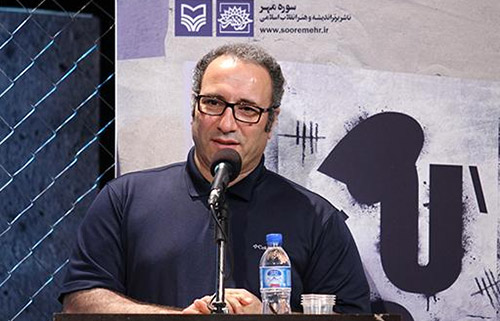
''Hey You'' as a part of the contemporary history of Islamic Revolution
Seyyed Reza Mir Karimi, the film director, also at the launch pointed out one of his memoirs with Saeed Abutaleb and stated: "The day Ebrahim Hatami-Kia and Majid Majidi and I were going to the airport to meet him, our talk was that if only the memories be written as soon as possible because Westerners benefit such opportunities very well and usually the person who first spoke, puts a greater impact on public opinion. While writing this book was delayed, but it is a positive move and narrates events that are not related only to it but also as a part of contemporary history of the Islamic Revolution. "
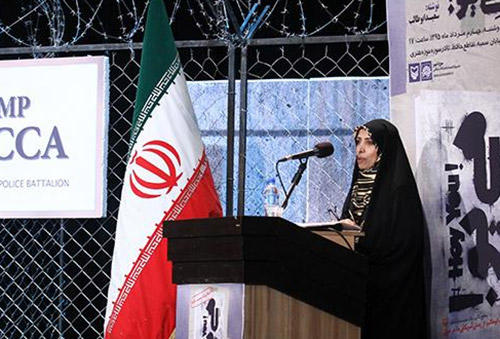
War correspondent must have immunity
Elham Aminzadeh, Special Assistant to the President for Legal Affairs in his speech also referred to the Law on Free Access to Information and stated: "all peoples throughout the world have the right to access to information. In times of war, throughout the world, correspondents and documentary filmmaker document it for posterity of the world, so that more wars will not be repeated in the future. So their role in such situations is very sensitive and they prevent making the mistakes repeatedly and make the government responsive to their mistakes and policies. So war documentarian reporters orient public opinion with their performance."
Special Assistant to the President for Legal Affairs with reference to the presence of correspondent in wars said "the presence risk of correspondent in war situations is very high. We were witness that reporters were facing with many difficulties, but according to international law unarmed correspondents have combat impunity. This Declaration passaged in 2003 in order to they can narrate war news with impunity. Passage of the declaration was because of that we witnessed the killing of 42 correspondents in Iraq during 1995 to 2003 which is unprecedented statistics."
Then, he pointed out treatments with Saeed Abutaleb and represents excerpts from the book as evidence of war correspondents innocence.
Literature looks at inside of a war
Following the launch, Morteza Sarhangi, director of the Office of Resistance Literature and Art referred to the poem of Arab poetry and Said: "Arab poet says, words are like grains of wheat that when put together, wheat fields forms and one can make a loaf of bread. Saeed Abutaleb has given us a loaf of bread in his book."
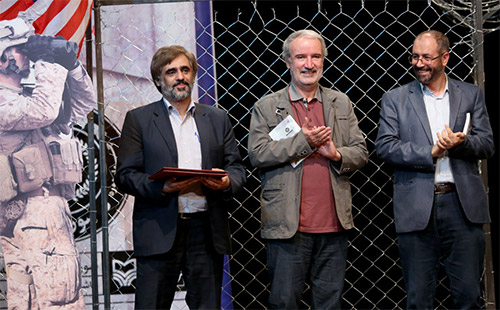
He continued: "I think if Abutaleb wouldn't have written these memories lived with the nightmare for a lifetime. Because official war histories did not speak about nightmares, but this is task of literature that can go inside of it through war and narrates the nightmares. The book is personal discussion of Abutaleb and narrates with his personal prose stories that he'd passed."
Sarhangi at the end of his speech Said: "Abutaleb really was lucky that when returned Americans world, survived. He could take his pen and wrote of those days and has conveyed the world he'd seen with this book. His prose in this book is like personal property, has fingerprints and because of this is close to the events and their reality and I congratulate Abutaleb to write this book. "
Everything was accounted accurate and fair
Saeed Abutaleb, author of "Hey You" as the last speaker at the launch of his book, stated: "A lot of people ask me why the publication of this book took long. That's the answer I have to say that when I came back from Iraq, I went to the parliament and after that I became alone and was able to write."
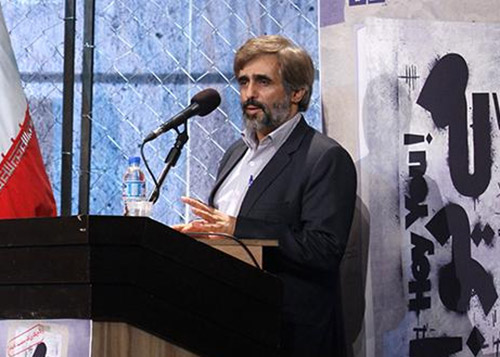
The documentary filmmaker went on to the book writing process and said: "I tried in writing the book that everything narrates accurate and fair. That's why I collected many documents and brought events carefully and with the hours of their occurrences in my book so that later will be cited them as evidence. In fact, it was in captivity that I saw the Americans notes carefully whatever happens to their subordinate prisoners in order to be document of their activity in the future. At that time, because I could speak a little Arabic and English, I got pen of the Red Cross officer insistently and I wrote quite accurately details of every event."
He concluded his speech to the characters in the book and said: "In my book, there are many bad Americans, but there are also some good Americans in this book. For example, the head of Camp Bucca is one of the good persons in the book. However, I know that the things he told us were lies, but he helped with his behavior so that we could maintain our spirit more in those situations. I hope we can invite head of Camp Bucca in order to come to Iran and speak in launch of English translation of the book."
At the end, attended by guests, the book " Hey You: an unfinished documentary chronology and memoirs of Saeed Abutaleb of the US prison in Iraq" was launched. The book as 647th produced product by the Office of Resistance Literature and Art was published by Sureh Mehr publications on 296 pages.
Number of Visits: 4498








The latest
- The Embankment Wounded Shoulders – 14
- An Eternal Lie!
- The 368th Night of Remembrance – Part 2
- Agents in Search for the Fighter
- The Embankment Wounded Shoulders – 13
- The Necessity of Standardizing Oral History and Criticism of General Mohsen Rezaei
- The 368th Night of Remembrance – Part 1
- Oral History News of Khordad 1404 (May 22nd – June 21st 2025)
Most visited
How to send Imam's announcements to Iran
In the first part, the issue of funds, Hajj Sheikh Nasrallah Khalkhali - who represented most of the religious authorities - was also the representative of Imam. In Najaf, there was a money exchange office that cooperated with the money exchange offices in Tehran. Some of the funds were exchanged through him.Operation Beit al-Moqaddas and Liberation of Khorramshahr
After Operation Fat’h al-Mobin, we traveled to Kermanshah and visited Sar-e-Pol-e-Zahab before heading to Ilam. During Operation Beit al-Moqaddas, the 27th Brigade was still receiving support from the West. We maintained contact with individuals who had previously worked in Area 7 and were now leading the brigade. It was through these connections that I learned about Operation Beit al-Moqaddas.Memoirs of Hujjat al-Islam Reza Motalebi
Hujjat al-Islam Reza Motalebi is a cleric from Isfahan. Before the revolution, he was the imam of the Fallah Mosque – which was later renamed Abuzar Mosque. By his presence and efforts, Abuzar Mosque soon became a base for supporters of the Imam and the revolution. After the victory of the revolution, he played a role in uniting forces and maintaining political vitality in southwest Tehran.The Necessity of Receiving Feedback in Oral History
Whenever we engage in a task, we naturally seek ways to evaluate our performance — to correct shortcomings and enhance strengths. Such refinement is only possible through the feedback we receive from others. Consider, for instance, a basketball player whose shots are consistently accurate; should he begin shooting blindfolded, his success rate would rapidly decline, as he would be deprived of essential feedback from each attempt.

